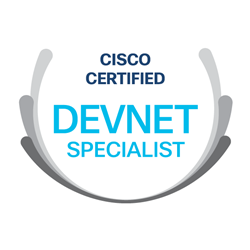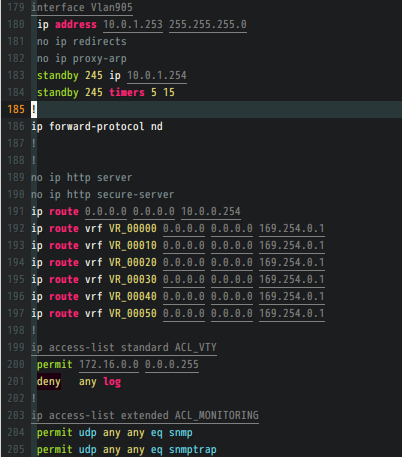Obiettivi | Certificazione | Contenuti | Tipologia | Prerequisiti | Durata e Frequenza | Docenti | Modalità di Iscrizione | Calendario

Il Corso DevOps Implementing DevOps Solutions and Practices Using Cisco Platforms è parte del percorso Cisco DevNet Professional. Questo corso prepara il partecipante come automatizzare la distribuzione delle applicazioni, abilitare la configurazione automatizzata, migliorare la gestione e la scalabilità dei micro-servizi cloud e dei processi di infrastruttura su piattaforme Cisco. Si imparerà anche come integrare Docker e Kubernetes per creare funzionalità avanzate e flessibili nella distribuzione delle applicazioni e altro ancora. Il Corso contribuisce alla preparazione dell’esame di Certificazione Cisco DevNet Professional (Esame 350-910).
Contattaci ora per ricevere tutti i dettagli e per richiedere, senza alcun impegno, di parlare direttamente con uno dei nostri Docenti (Clicca qui)
oppure chiamaci subito al nostro Numero Verde (800-177596)
Obiettivi del corso
Di seguito una sintesi degli obiettivi principali del Corso DevOps Implementing DevOps Solutions and Practices Using Cisco Platforms:
- Automatizzazione della distribuzione delle applicazioni.
- Abilitazione della configurazione automatizzata.
- Miglioramento della gestione e scalabilità dei micro-servizi cloud.
- Integrazione con Docker e Kubernetes per la distribuzione avanzata delle applicazioni.
- Ottimizzazione dei processi di infrastruttura su piattaforme Cisco.
Certificazione del corso
Esame 300-910 DEVOPS Implementing DevOps Solutions and Practices using Cisco Platforms;
Esame parte delle Certificazione Cisco Certified DevNet Professional. Il programma di certificazione DevNet Professional prepara per i nuovi ruoli professionali atti ad intercettare i cambiamenti dei paradigmi delle reti e delle infrastrutture. Essa convalida le competenze di sviluppatori di software di livello professionale, ingegneri DevOps, specialisti di automazione e altri professionisti del software. Il programma certifica le competenze tecniche chiave emergenti per un nuovo tipo di professionista IT, indispensabile alle organizzazioni per sfruttare il potenziale delle automazioni delle infrastrutture nell’ambito dell’Internet of Things (IoT), Data Center, Cloud e DevOps in generale. In particolare l’esame 300-910 DEVOPS testa competenze su argomenti quali: knowledge of DevOps, deployment automation, enables automated configuration, management, scalability of cloud microservices, infrastructure processes, Cisco platforms.
Contenuti del corso
- Introducing the DevOps Model
- DevOps Philosophy
- DevOps Practices
- Interact with GitLab Continuous Integration
- Introducing Containers
- Container-Based Architectures
- Linux Containers
- Docker Overview
- Docker Commands
- Explore Docker Command-Line Tools
- Packaging an Application Using Docker
- Dockerfiles
- Package and Run a WebApp Container
- Golden Images
- Safe Processing Practices
- Build and Deploy Multiple Containers to Create a Three-Tier Application
- Deploying a Multitier Application
- Linux Networking
- Docker Networking
- Explore Docker Networking
- Docker Compose
- Build and Deploy an Application Using Docker Compose
- Introducing CI/CD
- Continuous Integration
- CI Tools
- DevOps Pipelines
- Building the DevOps Flow
- GitLab Overview
- GitLab CI Overview
- Implement a Pipeline in GitLab CI
- Continuous Delivery with GitLab
- Automate the Deployment of an Application
- Validating the Application Build Process
- Automated Testing in the CI Flow
- Validate the Application Build Process
- Building an Improved Deployment Flow
- Postdeployment Validation
- Validate the Deployment and Fix the Infrastructure
- Release Deployment Strategies
- Extending DevOps Practices to the Entire Infrastructure
- Infrastructure as Code
- Build a YAML IaC Specification for the Test Environment
- Implementing On-Demand Test Environments at the Infrastructure Level
- Configuration Management Tools
- Terraform Overview
- Manage On-Demand Test Environments with Terraform
- Ansible Overview
- Ansible Inventory File
- Use the Cisco IOS Core Configuration Module
- Jinja and Ansible Templates
- Basic Jinja with YAML
- Configuration Templating with Ansible
- Build Ansible Playbooks to Manage Infrastructure
- Integrate the Testing Environment in the CI/CD Pipeline
- Implement Pre-Deployment Health Checks
- Monitoring in NetDevOps
- Set Up Logging for the Application Servers and Visualize with Kibana
- Create System Dashboard Focused on Metrics
- Use Alerts Through Kibana
- Instrument Application Monitoring
- Use Alerts and Thresholds to Notify Webhook Listener and Webex Teams Room
- Engineering for Visibility and Stability
- Application Health and Performance
- AppDynamics Overview
- Troubleshoot an Application Using AppDynamics with APM
- Chaos Engineering Principles
- Securing DevOps Workflows
- DevSecOps Overview
- Application Security in the CI/CD Pipeline
- Infrastructure Security in the CI/CD Pipeline
- Secure Infrastructure in the CI/CD Pipeline
- Exploring Multicloud Strategies
- Application Deployment to Multiple Environments
- Public Cloud Terminology Primer
- Tracking and Projecting Public Cloud Costs
- High Availability and Disaster Recovery Design Considerations
- IaC for Repeatable Public Cloud Consumption
- Cloud Services Strategy Comparison
- Examining Application and Deployment Architectures
- The Twelve-Factor Application
- Microservices Architectures
- Describing Kubernetes
- Kubernetes Concepts: Nodes, Pods, and Clusters
- Kubernetes Concepts: Storage
- Kubernetes Concepts: Networking
- Kubernetes Concepts: Security
- Kubernetes API Overview
- Explore Kubernetes Setup and Deploy an Application
- Integrating Multiple Data Center Deployments with Kubernetes
- Kubernetes Deployment Patterns
- Kubernetes Failure Scenarios
- Kubernetes Load-Balancing Techniques
- Kubernetes Namespaces
- Kubernetes Deployment via CI/CD Pipelines
- Explore and Modify a Kubernetes CI/CD Pipeline
- Monitoring and Logging In Kubernetes
- Kubernetes Resource Metrics Pipeline
- Kubernetes Full Metrics Pipeline and Logging
- Kubernetes Monitoring and Metrics–ELK
Attività Laboratoriali
- Interact with GitLab Continuous Integration (CI)
- Explore Docker Command-Line Tools
- Package and Run a WebApp Container
- Build and Deploy Multiple Containers to Create a Three-Tier Application
- Explore Docker Networking
- Build and Deploy an Application Using Docker Compose
- Implement a Pipeline in Gitlab CI
- Automate the Deployment of an Application
- Validate the Application Build Process
- Validate the Deployment and Fix the Infrastructure
- Build a Yaml Ain’t Markup Language (YAML) Infrastructure as Code (IaC) Specification for the Test Environment
- Manage On-Demand Test Environments with Terraform
- Build Ansible Playbooks to Manage Infrastructure
- Integrate the Testing Environment in the CI/CD Pipeline
- Implement Pre-deployment Health Checks
- Set Up Logging for the Application Servers and Visualize with Kibana
- Create System Dashboard Focused on Metrics
- Use Alerts Through Kibana
- Instrument Application Monitoring
- Use Alerts and Thresholds to Notify Webhook Listener and Cisco Webex® Teams™ Rooms
- Secure Infrastructure in the CI/CD Pipeline
- Explore Kubernetes Setup and Deploy an Application
- Explore and Modify a Kubernetes CI/CD Pipeline
- Kubernetes Monitoring and Metrics—Elasticsearch, Logstash, and Kibana (ELK)
Tipologia
Corso di Formazione con Docente
Docenti
I docenti sono Istruttori accreditati CISCO e certificati in altre tecnologie IT, con anni di esperienza pratica nel settore e nella Formazione.
Infrastruttura laboratoriale
Per tutte le tipologie di erogazione, il Corsista può accedere alle attrezzature e ai sistemi reali Cisco presenti nei Nostri laboratori o direttamente presso i data center Cisco in modalità remota h24. Ogni partecipante dispone di un accesso per implementare le varie configurazioni avendo così un riscontro pratico e immediato della teoria affrontata. Ecco di seguito alcune topologie di rete dei Laboratori Cisco Disponibili:

Dettagli del corso
Prerequisiti
Si consiglia la partecipazione al Corso Cisco CCNA nonché la partecipazione al corso Corso Cisco DevNet Associate e Corso Programmazione Python.
Durata del corso
- Durata Intensiva 5gg;
Frequenza
Varie tipologie di Frequenza Estensiva ed Intensiva.
Date del corso
- Corso Cisco DEVOPS (Formula Intensiva) – Su Richiesta – 9:00 – 17:00
Modalità di iscrizione
Le iscrizioni sono a numero chiuso per garantire ai tutti i partecipanti un servizio eccellente.
L’iscrizione avviene richiedendo di essere contattati dal seguente Link, o contattando la sede al numero verde 800-177596 o inviando una richiesta all’email contatti@vegatraining.eu.


